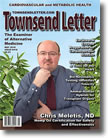|
On the cover
Part 2 is also online
Part 3 is also online
Page 1, 2
Cannabinoid-rich hemp oil has emerged as a promising botanical therapeutic with both clinical experience and published studies to support its use. The Stanley brothers are largely credited for first awakening the public to its benefits. The six Colorado siblings developed a hemp extract low in ∆9-Tetrahydro-cannabinol (THC), the psychoactive component in marijuana, and high in cannabidiol (CBD), a phytocannabinoid that is not associated with the intoxicating effects of the plant. That hemp extract came to be known as Charlotte's Web after the parents of a little girl named Charlotte Figi convinced the brothers to provide their daughter with CBD-rich hemp oil.1 Charlotte suffered from a severe type of medication-resistant epilepsy known as Dravet syndrome. She was having 300 seizures per week and her heart frequently stopped. After consuming three to four milligrams of the hemp oil per pound of body weight, Charlotte's seizures disappeared. The case received a lot of publicity in major media outlets such as CNN.1
 Townsend Letter provides a platform for those examining and reporting on functional and integrative medicine. Please support these independent voices. Townsend Letter provides a platform for those examining and reporting on functional and integrative medicine. Please support these independent voices. |
Since then the demand for hemp as a medicinal has skyrocketed and so too has the number of companies producing it and doctors prescribing it. Its benefits have been demonstrated both clinically and in the scientific literature. Based on that scientific research and clinical observations, I employ hemp oil in clinical practice to support the health of patients with epilepsy, anxiety, depression, post-traumatic stress disorder, schizophrenia, inflammation, and pain among other applications. Upcoming articles in Townsend Letter will discuss its clinical applications and the evidence in the medical literature. In this article, I will discuss a new cannabinoid certification program for both manufacturers and healthcare practitioners.
Why Manufacturers and Practitioners Need a Certification Program
When new segments of most fields of commercial enterprise enter the marketplace, there are the initial well-intentioned pioneers. This is also true in the hemp oil marketplace. However, like the dietary supplement industry in its early years, the hemp oil marketplace is a Wild Wild West. Up until now, no entity was ensuring the consumer that optimal quantities of the beneficial cannabinoids found in hemp oil were actually contained in the purchased product. As a manufacturer, in order to maintain a respectable reputation and avoid legal complications, it's important to ensure that the hemp oil you're producing lives up to its label specifications. A 2017 article in JAMA tested 84 CBD/hemp oil extracts purchased online and found that although CBD oil labeling had the highest degree of accuracy compared to other products tested, 55% of the CBD oil products tested were either underlabeled (more CBD was detected in the product than claimed on the label) or overlabeled (CBD content that was negligible or less than 1% of the amount on the label).2 In this study, the overlabeled CBD products contained insufficient levels similar to concentrations that resulted in Food and Drug Administration (FDA) warning letters sent to 14 businesses in 2015-2016. Some of the products also contained more THC than noted on the label. In the United States, only cannabinoid-rich hemp oil brands that contain less than 0.3% of the psychoactive cannabinoid THC are legal. Therefore, certainty surrounding the THC content of a particular brand is essential.
 The International Center for Cannabis Therapy (ICCT) found similar inaccuracies when its scientists tested hemp oil products sold mainly in online shops in Europe. Not one of the products tested was legally compliant as European legislation requires zero THC in hemp oil. Furthermore, the vast majority of products contained very little CBD and/or high concentrations of heavy metals and pesticides. The International Center for Cannabis Therapy (ICCT) found similar inaccuracies when its scientists tested hemp oil products sold mainly in online shops in Europe. Not one of the products tested was legally compliant as European legislation requires zero THC in hemp oil. Furthermore, the vast majority of products contained very little CBD and/or high concentrations of heavy metals and pesticides.
Another challenge that has arisen with the availability of hemp oil is that up until now, healthcare practitioners could not tap into a centralized knowledge base where they could have their cannabis questions answered. Because of hemp oil's relative newness in the dietary supplement arena, there are many healthcare practitioners who are unclear of the proper dosage. Some of them have employed hemp products in their practice with little success not realizing that the product may have contained insufficient CBD. I have also encountered uncertainty among practitioners about the best way to incorporate hemp oil into already-prescribed supplement regimens, whether there are any contraindications to its use, and how its effects differ from marijuana. In interacting with attendees of lectures I have conducted on the endocannabinoid system, it became clear to me that a number of healthcare practitioners have many questions and concerns about the prescribing of hemp oil as well as the endocannabinoid system on which it acts.
"It is essential that health professionals know what the cannabinoid content of a product is because depending on the illness being treated, too much or too little CBD can affect the outcome," said Petr Kastanek, PhD the director of the ICCT. "A Dravet syndrome patient for example will get strong relief from seizures using CBD, but too much CBD can actually trigger a seizure."
This echoes my clinical experience that as functional medicine providers we must always remember that all receptors throughout the body have an optimal tolerance – not only receptors for CBD – and there is such a thing as too much. This is particularly the case when there is an endogenous pathway which is being augmented, such as the endocannabinoid system. After all, achieving and sustaining homeostasis is the goal.
The ICCT's certification program will instruct practitioners (based on proven protocols) on the ideal amount of hemp oil. "Due to its non-toxic nature, a healthy patient won't suffer side effects, but flooding the CB1 and CB2 receptors with cannabinoids is not necessary or advised," said Petr Kastanek. "Micro dosing cannabinoids to activate the receptors creates a potent medical benefit in ICCT's experience."
Clearly, standards are needed both for all cannabis products and for practitioners prescribing them.
The International Center for Cannabis Therapy (ICCT)
The ICCT recognized the need for standards in the cannabis industry and consequently introduced three new certification programs: product certification, manufacturing facility certification, and medical certification for practitioners prescribing CBD and other active constituents of hemp. The ICCT is a Czech-based partnership of qualified doctors and scientists who specialize in the medical application of all forms of cannabis. ICCT scientists have spent decades conducting extensive research on the health benefits of medical cannabis as well as product development and medical treatment with an emphasis on enhancing the patients' quality of life.
The organization's certification programs are based on a decade of research conducted by more than 70 ICCT scientists from the Czech Republic and Israel. I recently became aware of the impressive ICCT's mission, clinical work, and the high-caliber of people associated with it. In addition to maintaining my naturopathic practice in Oregon, I accepted the role of Chief Medical Officer–USA of the ICCT.
ICCT Certification for Hemp Oil Manufacturers
The ICCT certification will standardize CBD-rich products and raw materials for human consumption. It uses metabolomic fingerprinting technology to construct a metabolic profile of the cannabinoid product through the pairing of data-rich analytic techniques with multivariate data analysis. The product will be analyzed for cannabinoid profile, pesticides, and contaminants. Manufacturers also have the option to obtain certification for their manufacturing facility similar to cGMP or NSF certification. The ICCT certification ensures that the manufacturer is compliant with local and state regulations. It also tests the quality and consistency of raw materials and provides staff training, product formulation, and compliant labeling. Annual randomized facility inspection is also a component of the manufacturing facility certification.
American Nutritional Products was the first hemp oil manufacturer to become certified by ICCT. "It is because of my 28 years in the supplement industry that I first realized what challenges were going to lie ahead for cannabis and hemp," said Maria Watson, president and CEO of American Nutritional Products, Inc. and former co-owner of Vitamin Research Products (VRP). "The supplement world started out with no known certification body and little control on quality. When we owned VRP, as an industry leader, we drove the movement to clean up our industry – that now needs to happen in the cannabis space."
Page 1, 2
|
![]()
![]()
![]()
![]()






